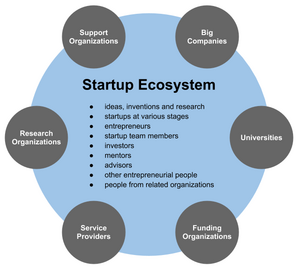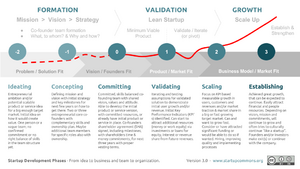Startup ecosystem
Topic: Earth
 From HandWiki - Reading time: 5 min
From HandWiki - Reading time: 5 min
A startup ecosystem is formed by people, startups in their various stages and various types of organizations in a location (physical or virtual), interacting as a system to create and scale new startup companies. These organizations can be further divided into categories such as universities, funding organizations, support organizations (like incubators, accelerators, co-working spaces etc.), research organizations, service provider organizations (like legal, financial services etc.) and large corporations. Local Governments and Government organizations such as Commerce / Industry / Economic Development departments also play an important role in startup ecosystem. Different organizations typically focus on specific parts of the ecosystem function and startups at their specific development stage(s).[1][2]

Composition of the startup ecosystem


- Ideas, inventions and research i.e. Intellectual property rights (IPR)
- Entrepreneurship Education[3]
- Startups at various stages[3]
- Entrepreneurs[3]
- Start up team members[3]
- Angel investors[4]
- Startup mentors[3]
- Startup advisors[3]
- Other business-oriented people
- People from other organizations with start-up activities
- Startup events
- Venture Capitalists[5]
List of organizations and/or organized activities with startup activities
- Universities[6]
- Students
- Advisory and mentoring organizations
- Startup incubators[6]
- Startup accelerators
- Coworking spaces
- Service providers (Consulting, Accounting, Legal, etc.)
- Event organizers[6]
- Start-up competitions[6]
- Startup Business Model Evaluators
- Business Angel Networks[6]
- Venture capital companies[6]
- Equity Crowdfunding portals
- Corporates (telcos, banking, health, food, etc.)
- Other funding providers (loans, grants etc.)
- Start-up blogs and social networks[7]
- Other facilitators
Investors from these roles are linked together through shared events, activities, locations and interactions. Startup ecosystems generally encompass the network of interactions between people, organizations, and their environment. Any particular start-up ecosystem[8] is defined by its collection of specific cities or online communities.
In addition, resources like skills, time and money are also essential components of a start-up ecosystem. The resources that flow through ecosystems are obtained primarily from the meetings between people and organizations that are an active part of those startup ecosystems. These interactions help to create new potential startups and/or to strengthen the already existing ones. There are a few common mistakes that entrepreneurs make that end up costing them their business, like inability to secure adequate funding, sudden market downturn and a poor scaling plan.[9]
External and internal factors
Startup ecosystems are controlled by both external and internal factors. External factors, such as financial climate, big market disruptions, and significant transitions, control the overall structure of an ecosystem and the way things work within it. Start-up ecosystems are dynamic entities that progress from formation stages to periodic disturbances (like the financial bubbles) and then to recovering processes.
Several researchers have created lists of essential internal attributes for startup ecosystems. Spigel[10] suggests that ecosystems require cultural attributes (a culture of entrepreneurship and histories of successful entrepreneurship), social attributes that are accessed through social ties (worker talent, investment capital, social networks, and entrepreneurial mentors) and material attributes grounded in a specific places (government policies, universities, support services, physical infrastructure, and open local markets). Stam[11] distinguishes between framework conditions of ecosystems (formal institutions, culture, physical infrastructure, and market demand) with systematic conditions of networks, leadership, finance, talent, knowledge, and support services.
Startup ecosystems in similar environments but located in different parts of the world can end up doing things differently simply because they have a different entrepreneurial culture and resource pool. The introduction of non-native peoples' knowledge and skills can also cause substantial shifts in the ecosystem's functions.
Internal factors act as feedback loops inside any particular startup ecosystem. They not only control ecosystem processes, but are also controlled by them. While some of the resource inputs are generally controlled by external processes like financial climate and market disruptions, the availability of resources within the ecosystem are controlled by every organization's ability to contribute towards the ecosystem. Although people exist and operate within ecosystems, their cumulative effects are large enough to influence external factors like financial climate.
Role of employee diversity
Employee diversity also affects startup ecosystem functions, as do the processes of disturbance and succession. Startup Ecosystems provide a variety of goods and services upon which other people and companies depend on. Thus, the principles of start-up ecosystem management suggest that rather than managing individual people or organizations, resources should be managed at the level of the startup ecosystem itself. Classifying start-up ecosystems into structurally similar units is an important step towards effective ecosystem managing.
Startup ecosystem studies
There are several independent studies made to evaluate start-up ecosystems to better understand and compare various start-up ecosystems and to offer valuable insights of the strengths and weaknesses of different start-up ecosystems. Startup ecosystems can be studied through a variety of approaches - theoretical studies, studies monitoring specific start-up ecosystems over long periods of time and those that look at differences between start-up ecosystems to elucidate how they work.
Since 2012, San Francisco-based Startup Genome has been the first organization to release comprehensive research reports that benchmark startup ecosystems globally. Currently led by JF Gauthier and Marc Penzel, the San Francisco-based startup has been the first organization to capture the requirements of a startup ecosystem in a data-driven framework.[12] Startup Genome's work influenced startup policies globally and is supported by thought leaders such as Steve Blank[13] and has appeared in leading business media such as The Economist, Bloomberg and Harvard Business Review.[14]
References
Notes
- ↑ "The $3 trillion global start-up economy ... where and how start-up ecosystems are driving new growth" (in en-GB). 2019-10-18. https://www.peterfisk.com/2019/10/the-3billion-global-start-up-economy-where-and-how-start-up-ecosystems-are-driving-new-growth/.
- ↑ Deeb, George. "How To Build A Startup Ecosystem" (in en). https://www.forbes.com/sites/georgedeeb/2019/04/04/how-to-build-a-startup-ecosystem/.
- ↑ 3.0 3.1 3.2 3.3 3.4 3.5 Empson, Rip (2012-04-10). "Silicon Valley, London, NYC: Startup Genome Data Reveals How The World's Top Tech Hubs Stack Up". TechCrunch. https://techcrunch.com/2012/04/10/startup-genome-compares-top-startup-hubs/. Retrieved 2013-11-17.
- ↑ Sreeharsha, Vinod (2008-12-25). "Fiscal Chaos Aside, Start-Ups Bloom in Argentina". The New York Times. https://www.nytimes.com/2008/12/26/business/worldbusiness/26peso.html?pagewanted=all&_r=0. Retrieved 2013-11-17.
- ↑ Raza, M. Tanzeem; Natarajan, P. (January 2023). "Factors Driving Venture Capital Investments in India" (in en). Journal of Entrepreneurship and Innovation in Emerging Economies 9 (1): 62–79. doi:10.1177/23939575221139944. ISSN 2393-9575. http://journals.sagepub.com/doi/10.1177/23939575221139944.
- ↑ 6.0 6.1 6.2 6.3 6.4 6.5 Zimmerman, Eilene (2013-07-17). "Austin's 'Silicon Hills' Builds on Its Infrastructure". The New York Times. http://boss.blogs.nytimes.com/2013/07/17/austins-silicon-hills-builds-on-its-infrastructure/?_r=0. Retrieved 2013-11-17.
- ↑ Markoff, John (2008-02-08). "Seattle Taps Its Inner Silicon Valley". The New York Times. https://www.nytimes.com/2008/02/08/technology/08nation.html?_r=0. Retrieved 2013-11-17.
- ↑ "Quick Facts about Startup Ecosystem in India" (in en). 18 July 2020. https://aatmnirbharsena.org/startup-ecosystem.
- ↑ Kronenberger, Craig (2021-03-29). "What Startup Model is Right for You?" (in en). https://medium.com/startup-studio-insider/startup-studios-vs-accelerators-82b8545aba0a.
- ↑ Spigel (2017) The Relational Organization of Entrepreneurial Ecosystems. 41(1): 49-72 DOI: 10.1111/etap.12167
- ↑ Stam (2015) Entrepreneurial Ecosystems and Regional Policy: A Sympathetic Critique. European Planning Studies 23(9): 1759-1769. DOI: 10.1080/09654313.2015.1061484
- ↑ Empson, Rip (20 November 2012). "Startup Genome Ranks The World's Top Startup Ecosystems: Silicon Valley, Tel Aviv & L.A. Lead The Way". https://techcrunch.com/2012/11/20/startup-genome-ranks-the-worlds-top-startup-ecosystems-silicon-valley-tel-aviv-l-a-lead-the-way/.
- ↑ "Download the 2015 Global Startup Ecosystem Ranking" (in en). http://startup-ecosystem.compass.co/ser2015/.
- ↑ "Transformational Entrepreneurship: Where Technology Meets Societal Impact". Harvard Business Review. https://hbr.org/2012/04/transformational-entrepreneurs.
Further reading
- A Beginner's Guide to the Nordic Startup Ecosystem – Forbes
- Knowledge Commercialization and Valorization in Regional Economic Development
- Startup Weekend: How to Take a Company From Concept to Creation in 54 Hours – Marc Nager, Clint Nelsen, Franck Nouyrigat
 |
 KSF
KSF